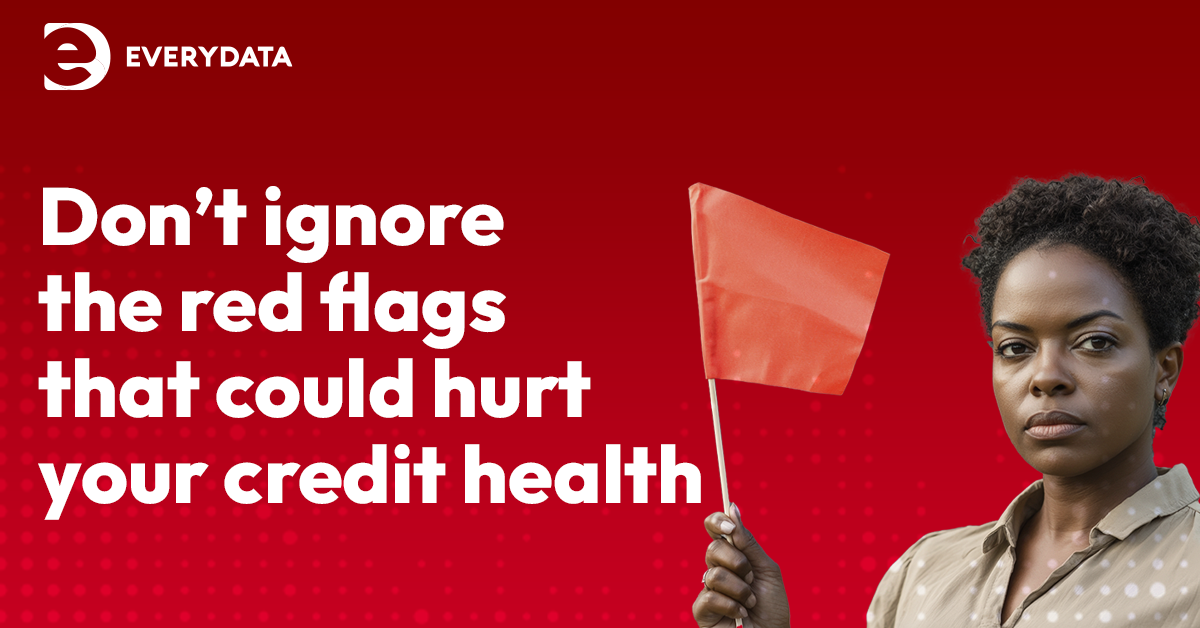
In today’s world, your credit report is more than just a number — it’s a reflection of your financial health. Whether you’re applying for a loan, renting an apartment, or even applying for a job, your credit history often plays a key role in the decision-making process.
Unfortunately, many people unknowingly damage their credit simply by overlooking a few important habits. At EveryData, we believe in giving you the knowledge and tools to take control of your financial future. In this post, we’re breaking down some of the biggest red flags that can hurt your credit health — and how to avoid them.
- 🔴 Frequent Missed or Late Payments
Why it matters:
Payment history is the most important factor in your credit score, making up roughly 35% of the total. One missed payment can stay on your report for up to seven years, and the more recent it is, the more it affects your score.
How to avoid it:
- Set up automatic payments or reminders to pay bills on time.
- If you miss a payment, pay it as soon as possible — the longer it goes unpaid, the more damage it does.
- If you’re struggling financially, contact your creditor. Some may offer hardship programs or flexible payment plans.
-
- 🔴 Maxed-Out Credit Cards
Why it matters:
Using too much of your available credit — known as credit utilization — is another major factor in your score. A high utilization rate (typically above 30%) can signal to lenders that you're overextended, even if you're making payments.
How to avoid it:
- Aim to keep your balances below 30% of your credit limit.
- Pay your balances in full every month, or at least more than the minimum.
- Consider asking for a credit limit increase, but only if you won’t be tempted to spend more.
- 🔴 Ignoring Your Credit Report
-
-
Why it matters:
Mistakes happen — and sometimes, they’re not even your fault. Errors, fraudulent accounts, or outdated information on your credit report can drag down your score and cost you money.
How to avoid it:
- Check your credit report regularly using EveryData to monitor for any inaccuracies.
- Look out for accounts you don’t recognize, incorrect balances, or outdated personal information.
- If you spot something wrong, dispute it immediately through the app or relevant credit bureau.
- 🔴 Taking on Too Much Debt at Once
Why it matters:
When you apply for several new credit accounts in a short time, it can look like you’re in financial trouble — even if you’re not. This can hurt your score due to the “new credit” factor and result in multiple hard inquiries.
How to avoid it:
- Space out your credit applications. Only apply when necessary.
- Avoid opening store cards or unnecessary loans just for discounts or perks.
- Use the EveryData app to track when and where your credit is being checked.
- 🔴 Closing Old Credit Accounts
Why it matters:
Closing an old account, especially one with a long history, can reduce the average age of your credit accounts and impact your utilization rate. Both can negatively affect your score.
How to avoid it:
- Keep old credit cards open, even if you rarely use them — they add to your credit age.
- If you must close a card, choose newer accounts with high fees.
Use older cards occasionally for small purchases to keep them active.
- 🔴 Co-Signing Loans Without a Backup Plan
Why it matters:
When you co-sign a loan, you’re just as responsible for the payments as the main borrower. If they miss a payment or default, your credit takes the hit, too.
How to avoid it:
- Only co-sign if you’re willing and able to repay the loan yourself.
- Monitor the loan closely and ensure payments are being made.
- Have a written agreement with the borrower on responsibilities and expectations.
-
- 🔴 Falling for Scams and Identity Theft
Why it matters:
If someone steals your identity and racks up debt in your name, it can tank your credit and take years to resolve. Identity theft is increasingly common, especially with more of our personal info online.
How to avoid it:
- Monitor your credit regularly using EveryData's real-time alerts.
Never share sensitive info over email, text, or social media.
Use strong passwords and enable two-factor authentication where possible.
How EveryData Helps You Stay Ahead 🚀
At EveryData, we believe financial empowerment starts with access and awareness. Our easy-to-use app gives you instant access to your credit report, credit score, and monitoring tools to help you spot red flags before they become major issues. With EveryData, you can get real-time alerts when your credit changes and review your full credit report in seconds. Your credit health is a long-term journey, not a one-time check. Avoiding red flags like missed payments, high credit utilization, and ignoring your report can make a world of difference in your financial future.